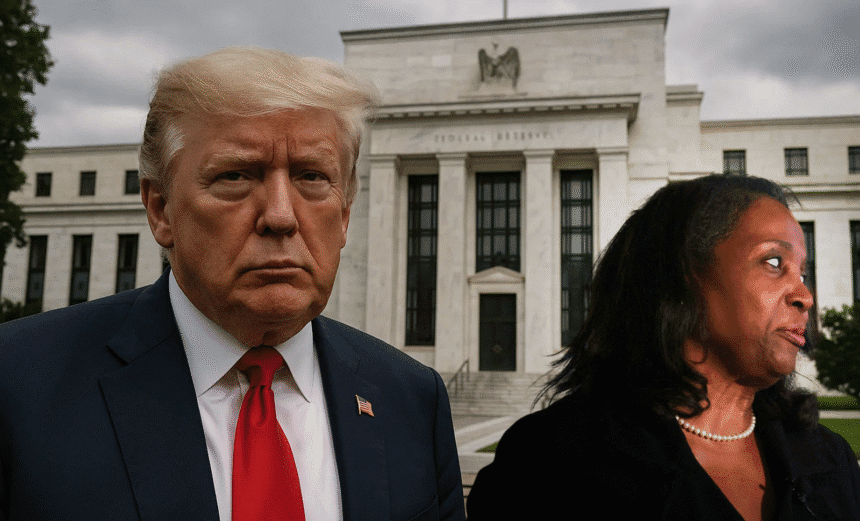Former U.S. President Donald Trump has urged Federal Reserve Governor Lisa Cook to resign following recent allegations linked to a controversial mortgage arrangement, stirring political and financial debates across Washington. The demand was made public on Thursday during a press briefing at Trump’s Bedminster estate in New Jersey, where he argued that Cook’s continued presence on the Federal Reserve Board undermines the institution’s credibility at a time of economic uncertainty.
The controversy began earlier this week when investigative reports suggested that Cook may have benefited from a preferential mortgage deal dating back to 2019, before her appointment at the Fed. The reports alleged that the mortgage terms were unusually favorable compared to standard market rates, raising questions about possible conflicts of interest if the lending institution had regulatory ties to the Federal Reserve. Although no formal charges or legal findings have been made, the claims have sparked concern among lawmakers and analysts about transparency and accountability within one of the nation’s most powerful financial institutions.
In his remarks, Trump seized on the reports, declaring that the Federal Reserve could not afford to be led by an official facing such allegations. He said Cook should resign “immediately for the sake of integrity and trust in our financial system.” His comments reignited memories of his own contentious relationship with the central bank during his presidency, when he frequently clashed with Fed Chair Jerome Powell over interest rate policies. Many observers view Trump’s latest intervention not only as a direct challenge to Cook but also as part of his broader strategy to frame Democrats as unfit to manage financial governance.
Lisa D. Cook, a distinguished economist and the first Black woman appointed to the Federal Reserve Board, has served since May 2022. She previously worked as a professor of economics at Michigan State University and held advisory roles during the Obama administration. Her appointment was celebrated as historic and a step toward greater diversity in financial policymaking, though it was met with partisan resistance from Republicans who questioned her experience in monetary policy. The recent allegations now threaten to deepen that divide, casting a shadow over her achievements.
According to early reports, the mortgage arrangement in question may have provided Cook with below-market terms under circumstances that critics argue should have been disclosed more clearly during her nomination and confirmation process. While details remain unclear, the insinuation that she could have benefited from financial favoritism is fueling political attacks. A Federal Reserve spokesperson responded on Friday, stressing that the institution “takes such matters seriously and will review all relevant facts,” though no formal investigation has yet been announced. Cook herself has not issued a detailed public statement, though those close to her suggest she views the reports as politically motivated.
Trump’s call for Cook’s resignation underscores the growing politicization of the central bank. By targeting her specifically, he is challenging not just an individual but also the independence of the institution itself. Analysts note that this latest confrontation echoes Trump’s earlier battles with the Fed, during which he openly pressured the central bank to adopt policies favorable to his administration. Dr. Rachel Anderson, a political economist at Georgetown University, observed that “this isn’t just about Cook, this is about Trump positioning himself as a defender of ordinary Americans while portraying Democrats as weak on financial ethics.”
The allegations and Trump’s remarks also come at a time when the Fed faces enormous challenges. Inflation remains stubborn, mortgage rates are elevated, and public anxiety about housing affordability is growing. Any controversy involving a top policymaker risks eroding public trust at a delicate moment for the economy. Critics worry that the perception of impropriety, even absent formal wrongdoing, could damage confidence in the central bank’s leadership.
Not all political leaders share Trump’s view. Senator Elizabeth Warren strongly defended Cook, describing the attacks as “baseless and designed to weaken confidence in the Fed.” She praised Cook’s efforts to highlight economic inequality and argued that targeting her only undermines the institution’s ability to focus on pressing economic challenges. Other Democratic lawmakers have echoed Warren’s sentiments, warning against politicizing the Fed’s work.
What happens next remains uncertain. Congressional Republicans could push for hearings or investigations, while the Biden administration is expected to stand firmly behind Cook. For now, she continues in her role with no signs from the White House or the Fed that her position is under immediate threat. Yet the controversy illustrates how allegations, whether proven or not, can quickly become political weapons, shaping public discourse around the credibility of America’s most important financial institutions.












